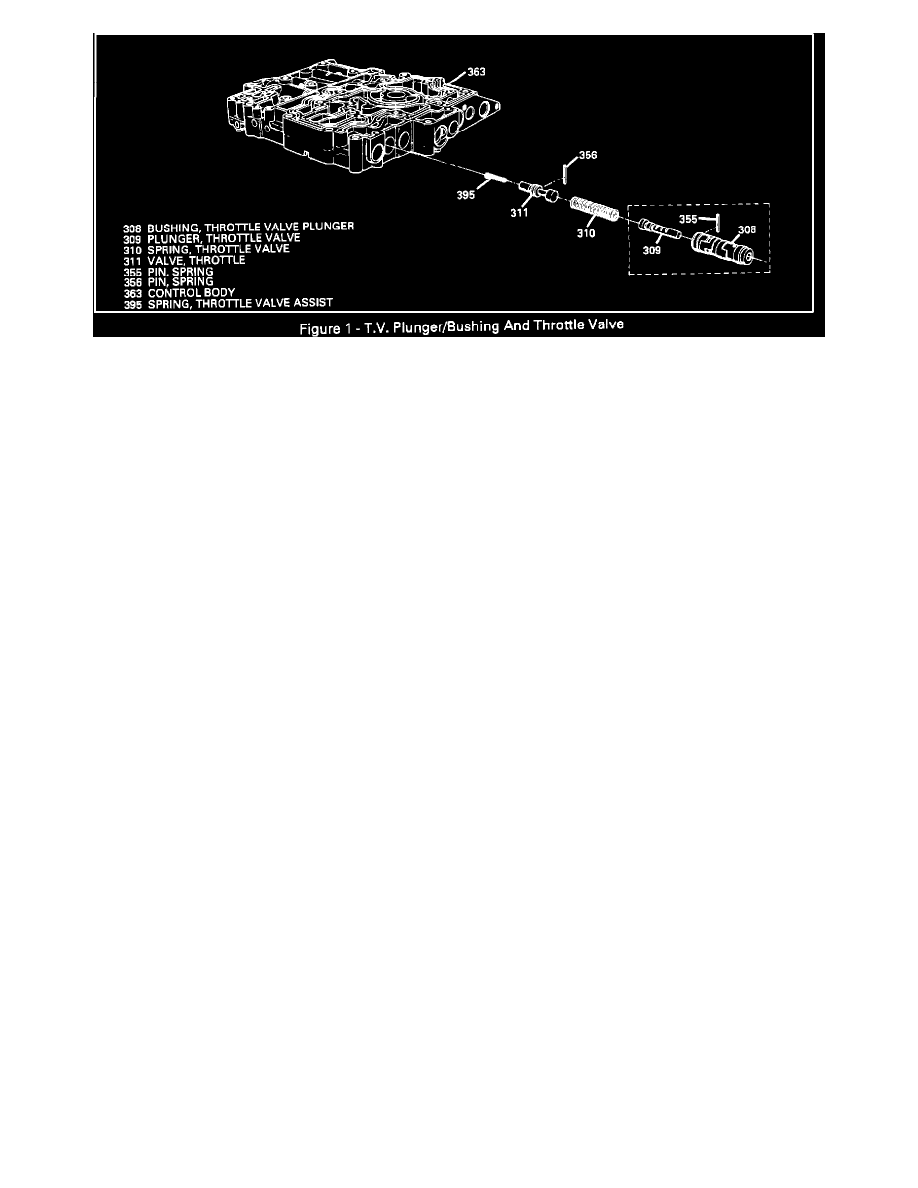Celebrity V6-173 2.8L VIN X 2-bbl (1985)

Figure 1
^
Check T.V. cable for correct part number, listed in the parts catalog.
^
Check T.V. cable for kinked, binding, disconnected or broken condition.
^
Proper T.V. cable set.
^
Is there tension on the T.V. cable when being pulled and being released (with engine off)?
-
If the T.V. system fails this test, it could be caused by a disconnected throttle lever to cable link (49), a stuck T.V. plunger in the T.V. bushing
or a broken T.V. cable.
^
If the T.V. cable has tension when the engine is off but when the engine is started, the cable goes slack. The T.V. plunger is being sucked into the
bushing because the T.V. plunger assist that reduces accelerator pedal effort is receiving too much pressure.
-
The throttle valve (311) may be sticking or stuck in the bore. This could be caused by sediment. The valve must move freely in the bore. Clean
the valve and bore so the valve moves freely in the bore. Follow the procedures outlined in Dealer Service Bulletin No. 86-49.
NOTICE:
Excessive lapping of the valves for a HYDRA-MATIC 4T60 (THM 440-T4) may cause the valves to stick. Too much lapping can take
the sharp cleaning edge off the valve land. Sediment can now wedge between the valve land and bore, causing the valve to stick. Also,
the lapping material can impregnate into the valve lands, causing the valve bore to excessively wear. This will cause the valves to stick
unless the valves are lightly lapped, then cleaned in an ultrasonic parts cleaner to prevent bore wear.
-
If the throttle valve moves freely in the bore, then the pump cover is missing the machining of the throttle valve (311) exhaust.
^
Governor system for rise in pressure of approximately 1 PSI (6.895 kPa) for every MPH (1.6093 km/h) when a pressure gauge is connected to the
governor pressure tap.
IMPORTANT:
Some "rules of thumb" for governor pressure:
-
At 0 MPH (0 km/h) the PSI will be about 0 - 4 (0 - 27.58 kPa) depending on the model.
-
Below 30 MPH (48 km/h) the pressure in PSI (only) will be at or below the MPH reading by as much as 6 PSI (41.37 kPa); above 30 MPH (48
km/h) the pressure in PSI (kPa) will be at or somewhere above the MPH reading by as much as 20 PSI (137.9 kPa).
-
The reading for a cold transaxle and hot transaxle should be about the same; if not, then orifice # 5 - a slot in the accumulator cover gasket (119) -
may be clogged or the governor assembly could be leaking. Orifice # 5 temperature compensates the flow needs in the governor circuit. Also, the
accumulator cover to case bolt(s) could be loose, causing the cold governor pressure reading to be much higher than the hot reading pressure. This
would allow 4th gear when cold and no 4th gear when hot.
-
A clogged governor screen that is in the case will cause early upshifts and not delayed upshifts.
^
The bottom line is that governor pressure MUST increase with MPH (km/h).
SERVICE PROCEDURE:
If during the diagnosis of the T.V. and governor system it is found that the T.V. plunger/ bushing assembly is worn/sticking/binding, replace the
assembly with the parts listed in SERVICE PARTS INFORMATION.
SERVICE MANUAL REFERENCE:
See the 1984-90 Service Manual for repair procedures.
